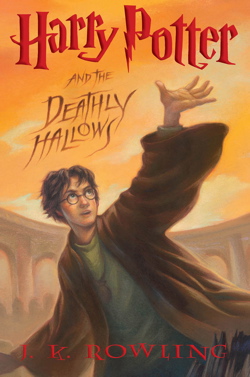
Donna Freitas (FRAY-tus) has carved out a career as a religion scholar focusing on young adults’ spirituality and sexuality (Sex and the Soul, Oxford). But in her other life, she’s also a YA novelist whose first book, The Possibilities of Sainthood (Farrar, Straus & Giroux), got starred reviews pretty much every place that fiction reviews can be starred: PW, SLJ, Booklist, and even snotty old Kirkus.
In her new novel This Gorgeous Game, Donna’s telling a darker story for YA readers. Olivia Peters is a rising high school senior who is stalked by a priest. Although at first she’s flattered by his attention to her writing and his belief in her literary talent, it isn’t long before she realizes that his unwanted attention is inappropriate. But what can a 17-year-old do when her stalker is a famous author and universally beloved Catholic priest?
FS: Why did you want to follow up the happy-go-lucky novel The Possibilities of Sainthood with this more serious story?
Donna Freitas: It’s not so much that I decided to follow up my shiny happy novel about a girl looking for her first kiss with a sad novel. For me, writing fiction is more about voice, and following the voice that shows up in your head. Olivia’s voice was the next one to show up, so hers was the story I decided to follow. And it happened to be really sad and dark.

FS: The cover is very arresting — Olivia is backed into a corner and seems almost pinned down by the cross. Do you think that it represents what you’re trying to convey in the book about religion?
Freitas: I was really stunned when I saw what the publisher came up with for the cover. I couldn’t think of a better cover to represent the different layers of the book. They came up with shaping the title and my name into the cross. But to be honest, I think the cover effectively portrays Olivia in the book. I was really adamant that there be no hint of a man on the cover. I wanted the cover just to be hers. One of the things I love about that photograph is that it can be interpreted in different ways. She does look like she’s backed into a corner and frightened. But she also could be glaring at you, like she might spring at you. I really love the way they figured out how to represent what she’s going through in the book with the priest without putting him on the cover. The cross represents him, and it’s perfect.
FS: I know it wasn’t intentional, but the timing of the novel coincides with some serious struggles the Catholic Church is having with sexual abuse by priests. As a self-described Catholic, how are you coping with the Church’s current fiasco?
Freitas: I think the only thing that has changed since 2002, when the first wave of abuse was covered by the media, is that the media stopped talking about it for a while. I don’t think the Catholic Church has coped with the scandal effectively, and so the fact that it has come into the news again doesn’t surprise me. We have a long way to go in terms of what has happened in the past and what is still going on in many communities. It not only saddens me; it’s very painful to read these stories for all sorts of reasons. When I wrote Olivia’s story, even though it probably sounds upsetting, I wanted to put the reader in the shoes of a person who was dealing with an abusive priest. And I think it’s different to stand in those shoes and feel all of the emotions and the questions that someone asks who’s actually in that position, than it is to just read about it in the paper. I feel like that’s what’s been missing from the story: that first-person experience.
FS: So now that you’ve done this darker story, are you returning to The Possibilities of Sainthood anytime soon? Can you give us a hint about what will happen to Antonia Lucia Labella?
Freitas: At some point I really want to write a sequel to The Possibilities of Sainthood. I’ve worked on one on and off, but I have a third novel coming out next year that’s totally different. It’s called The Survival Kit, and it’s a book that starts with sadness and moves toward happiness. It’s about a girl named Rose whose mother has just died. Before her mother died, she made Rose a survival kit with all these items to help her move on and to start over. The items are what frame Rose’s story over the course of the year after her mother’s death. I think it’s a hopeful book. I loved writing it. A romance is a huge part of it, and I loved writing it more than any romance I’ve written. Apparently falling in love is a huge part of getting through grief.
FS: Incidentally, I loved the romance in This Gorgeous Game between Jamie and Olivia. Can I marry Jamie?
Freitas: Is that your question?
FS: Yeah, that’s totally my question.
Freitas: Well, right now Jamie’s taken. I think he’s still dating Olivia. I’m sorry.
FS: Bummer. Next you’ll be telling me that Jamie isn’t real or something. And speaking of non-fiction, you have this other life as a religion scholar, and you made a big splash a few years ago with the non-fiction book Sex and the Soul: Juggling Sexuality, Spirituality, Romance, and Religion on America’s College Campuses. And right now you’re working on a follow-up to that project, yes?
Freitas: Yes. It’s due in at the end of the summer, so I’m guessing it’ll come out next fall or winter. Right now it’s called Virginity Matters, and that title is pretty layered. It’s mining data from the study that became Sex and the Soul. I have enough data from that project to last decades, and there was no way to fit it all into the first book. Sex and the Soul was about trying to draw the most important contours of the conversation, and this next one homes in on really specific issues that are important to students. So it’s a combination of the data and also what I personally think about some of the data. What we do in light of these findings? A woman at Boston College who has been teaching Sex and the Soul for several semesters told me, after I shared that I was having difficulty writing about my own opinion, that I’d earned the right to tell people what I thought. That was a very freeing thing for me to hear her say.
FS: We’ll look forward to that book. Thanks for the interview!

